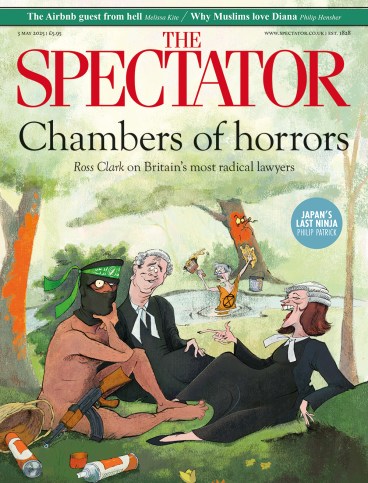
Congratulations to Donald Trump. It is almost solely thanks to his exertions that Mark Carney, the incarnation of Davos man, is now victorious in Canada’s general election. The Euro fanatic now wins on a ‘sovereignty’ ticket. If Trump had not intervened to lay claim to Canada, almost as if America were Russia and Canada were Ukraine, it would have gone Conservative. The President may be only hazily aware that the King, of whom, he says, he has the ‘honour to be a friend’, is also King of Canada. If, as seems likely, the King follows his mother’s twice-used precedent and opens the new Canadian parliament in person, Trump may come to see that his next-door neighbour is part of a long-standing, legitimate order which Canadian voters are happy to endorse. P.S. Nearly 3 per cent of Canadians are of Ukrainian heritage. I bet that they, accidentally encouraged by Trump, helped Carney over the line.
The Canadian situation is making me pay more attention to the war of 1812. It was an American attempt to drive the British out of Canada. The American national anthem, ‘The Star-Spangled Banner’, was written on 16 September 1814 to celebrate the heroic defence of Fort McHenry against British attack. In a verse not usually sung, the author, Francis Scott Key, asks: ‘And where is that band who so vauntingly swore/ That the havoc of war and the battle’s confusion/ A home and a Country should leave us no more?/ Their blood has washed out their foul footstep’s pollution.’ The refrain, famously, celebrates ‘the land of the free and the home of the brave’.
America was also, however, the home of the slave, as Key, perhaps literally to his cost, knew, being himself a slave-owner. The United States essentially lost the war. As well as setting fire to the White House and the Capitol building, which was under construction, the British kept Canada safe and British, until it became self-governing in its own good time (1867). In the House of Lords today, the government chief whip is excellently served by Matthew Taylor, easily recognisable to peers because of the unusual hairstyle with which he sets off his clerk’s coat and breeches. In his spare time, Mr Taylor is a considerable military historian. He recently published a fascinating book about the 1812 war called Black Redcoats (Pen and Sword). It concerns the black men, mostly escaped slaves, who fought for the British against the United States, chiefly under the name of Colonial Marines. There were nearly a thousand of them altogether, notable for their courage and vital for their local knowledge, which enabled them to guide their comrades through dense woods. They were made free men by the British and, where possible, allowed to bring their women and children out of slavery with them. After the war ended, their former owners tried to recover them though legal processes, but the ingenious Admiral Cockburn gave a generous interpretation to Lord Mansfield’s ‘Somerset’ decision that there is no slavery in British law. Cockburn declared that his British ships were, in effect, Britain, so the men had ceased to be slaves simply by boarding them.
Matthew Taylor quotes two cracking speeches by Major Edward Nicholls, down in Pensacola. To his white Royal Marines, he said: ‘When the men of colour… arrive you will be strictly careful in your language and manners to them. Remember they have been oppressed by cruel taskmasters and under slavery man’s best faculties are kept dormant – what a glorious prospect for British soldiers to set them free.’ To the Colonial Marines, he proclaimed: ‘You have dared to be free. Exert yourselves to the utmost to become disciplined… you will unrivet the chains of thousands of your colour now lingering in bonds.’ They would have ‘the comforts of enjoying rational liberty, solid property with the rights of a British man’. Towards their oppressors, he begged them ‘to be Christians by their deeds… it is only the coward that will take revenge on a fallen enemy’. Rather, ‘Rush on them with your bayonet!’, ‘riveted to your duty to God… loyal and true to your King and Country’. One irony was that American Indians, allied to the British, sometimes possessed black slaves themselves. These the British freed, paying the Indians $25 a head.
On the evening of 3 August 1914, the foreign secretary, Sir Edward Grey, looked out of his office window and saw workers lighting the gas lamps in St James’s Park. He said: ‘The lights are going out all over Europe, we shall not see them lit again in our lifetime.’ Obviously, Grey was speaking metaphorically: no one, not even mighty, aggressive Germany, could cause a pan-European power cut. But if he were foreign secretary today, he would be imagining a real possibility. On Monday, the lights went out all over Spain and Portugal. Our technological developments make us ever more dependent on electricity and our net-zero policies, particularly in Britain, make that electricity vulnerable to the failure of the renewables we advance with religious fervour and lordly disdain for cost.
I agreed to speak at the Simonsbath Festival later this month, to discuss with Victoria ‘Tortie’ Eveleigh her book Exmoor Farms: A Year on the Moor. Arrangements were made. Then I received from Tortie an email intended not for me but for the festival organiser. It read: ‘I said I’d pick up Charles from Taunton station, but now I can’t because I’ve just had an email about a dung beetle workshop for the Reviving Exmoor’s Heartlands project. Is there any way you can arrange for somebody else to? I must confess to being particularly interested in dung beetles.’ Naturally, Tortie was mortified by her mistake, but I hope readers will agree that a person who puts dung beetles first is a person worth listening to, and will flock to Simonsbath to hear our conversation.








Comments